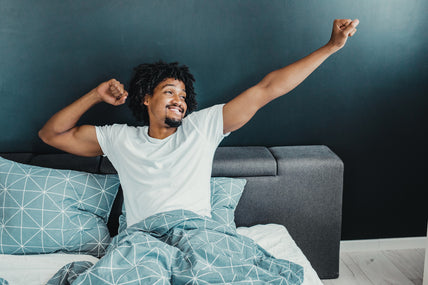Stressed Out? Trouble Sleeping? Here's why

There are a couple of common reasons why people have difficulty falling sleeping. Sleeplessness can result from aging, downing too much caffeine, noise distractions in the bedroom, an uncomfortable bed, blue light from your digital devices, over-excitement, and of course, stress.
According to a 2009 stress survey carried out by the American Psychological Association, 3 out of every 4 U.S. adults said they had moderate to high levels of stress in the past month.
Even teenagers are not left out in this insomnia web. They sometimes have trouble in school -- and the family finance issues back at home -- might be stressing them out too.
When you have a lot on your mind, it’s tough getting into a calm state in readiness for sleep. Here’s how Joyce Walsleban, associate professor of medicine at NYU's School of Medicine puts it: “No one sleeps well with worries. They are too alerting. They will either keep you up or wake you up later on.”
Sleeplessness [especially for a prolonged period of time] is often the result of a sleep disorder.
Common symptoms of a sleep disorder include:
- Feeling irritable during the day
- Drifting off easily while driving
- Difficulty concentrating for any amount of time
- Needing caffeinated drinks to stay alert
- Feeling the need to take a nap every single day
Well, now that you know the symptoms, let’s take a quick look at 5 of the most common sleep stealers, shall we?
#1: Insomnia
Yep, insomnia is probably the No.1 sleep stealer in the world! People with insomnia have trouble falling asleep or staying asleep, plus the condition can be short-term (acute) or can last a long time (chronic).
Insomnia can be a result of stress, jet lag, or perhaps a health condition. It can also result from mood disorders like anxiety and depression.
#2: Stress
When you’re stressed out, the weight of the day presses down on you, making it difficult to have a good night’s sleep. You find it hard to relax or calm down, and therefore experience difficulty falling asleep. This usually happens when you can’t seem to unplug from the demands of your day or when you’re already worrying over the next day’s task.
#3: Shift work sleep disorder
Shift work sleep disorder happens when your work schedule upsets your circadian rhythm, resulting in a sleep-wake imbalance.
With businesses running 24/7 today, many people have to run night shifts, early morning shifts, and even rotating shifts that often force them to stay awake and work when they should be sleeping, or force them to sleep when their body is signaling them to wake up.

#4: Jet lag
Jet lag, like shift work sleep disorder, interrupts your regular sleep-wake cycle. It occurs when you travel across time zones on long-haul flights.
Jet lag symptoms include; daytime sleepiness, headaches, fatigue, stomach problems, and insomnia.
#5: Diet
Yes, what you take in during the day or just before bedtime can affect your sleep significantly at night.
For instance, if you eat big meals that leave you uncomfortably full, or spicy foods that contribute to painful heartburn, or down too much caffeine, you’d have difficulty falling asleep at bedtime.
Caffeine, for instance, is still very active in your system 6 hours after taking it. So, imagine taking a caffeinated beverage around 10 pm -- it probably would be preventing you from sleep until say, 4 am!
So, that’s it folks -- but before you go…
Why not try our gentle, natural herb -- Herbal Calm which helps calm down the mind and body during periods of stress. Ready? Get it, right here.




